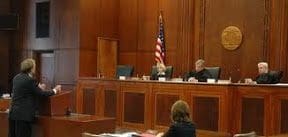Oct 28, 2021 | Sixth Circuit
In United States v. Davila, the defendant pled guilty to conspiracy to defraud the United States by obtaining false tax refunds. Prior to his plea, the defendant requested that the magistrate judge discharge his court-appointed attorney for failing to discuss any strategies aside from pleading guilty. At this hearing, the magistrate judge instructed the defendant as follows:
“The only thing at your disposal that is entirely up to you is the two or three level reduction for acceptance of responsibility. That means that you’ve got to go to the cross. You’ve got to tell the probation officer everything you did in this case regardless of how bad it makes you appear to be because that is the way you get that three-level reduction for acceptance, and . . . someone with your criminal history needs a three-level reduction for acceptance.”
On appeal, the Eleventh Circuit held that the magistrate judge’s comments violated Federal Rule of Criminal Procedure 11(c)(1), which prohibits “the participation of the judge in plea negotiations under any circumstances.” Even though the defendant failed to raise a Rule 11 violation on appeal, the Eleventh Circuit held that a violation of this rule is plain error and the defendant was not required to show actual prejudice. Although other circuits recognize harmless error in this context, the Eleventh Circuit made clear that it does not, explaining that even if judicial participation is well-intentioned it will result in convictions being vacated, remanded, and reassigned to another judge.
Oct 27, 2021 | Business Law
In United States v. James Brown, the defendant was convicted of mail fraud and transporting forged securities in violation of 18 U.S.C. § 2314, which makes it illegal to knowingly transport in interstate commerce stolen/fraudulent securities or money “of the value of $5,000 or more.”
As a matter of first impression, the Eleventh Circuit addressed whether the “value” element of 18 U.S.C. § 2314 is satisfied by the amount payable as written on the face of the instrument even if the instrument itself was cancelled and, therefore, worthless before it was transported. The court of appeals rejected Brown’s argument that value should be interpreted to mean “actual worth,” holding that the meaning of value under the statute was the value listed on the face of the instrument, whether or not the instrument itself had any actual value or worth.
In its reasoning, the Eleventh Circuit turned to 18 U.S.C. § 2311, which defines value as “face, par, or market value, whichever is greatest.” Although “face” is not expressly defined in the statute, the court turned to its plain meaning: the value listed on the face of the instrument. The court relied on the Fifth Circuit’s interpretation of this statute in United States v. Onyiego (holding that forged airplane tickets with a face value of over $5000 satisfied the value element of 18 U.S.C. § 2314 even though the tickets themselves were “made up” and actually worth nothing).
Oct 26, 2021 | Drug Cases
BAC
BAC is the blood-alcohol content in a person’s blood. It is expressed as a percentage. There is a presumption in every state that a BAC of .08 or higher is per se proof of impaired driving or DUI for driving a car on a public road.
For individuals under the age of 21 in Tennessee the BAC presumption is .02 or higher for per se proof of impairment. For commercial licenses a BAC of .04 or higher is proof of impairment.
Blood-alcohol concentration (BAC) is expressed in percent weight by volume (% w/v) based upon grams of alcohol per 100 cubic centemeters of blood or per 210 L of breath. A BAC of 0.08 % w/v means 0.08 g of alcohol per 100 cm³ of blood (0.008g/100cc) or 0.08 g of alcohol per 210 L of breath.
Incidentally the BAC levels for some other countries is: China .02, India .03, Norway .02, England .08, France .05.

Oct 25, 2021 | acca
The Tennessee Judicial Ethics Committee recently released an advisory opinion regarding judges and proper social media etiquette, something that legal experts have seen land judges across the country in controversy recently. In an attempt to avoid some of the same problems in Tennessee, the Committee is attempting to convey how important it is for judges to choose their online “friends” wisely.
Just last year a judge a Philadelphia was under scrutiny after prosecutors discovered he was friends with a man whose drunk driving case was before him. The judge threw out several key parts of his case. In North Carolina, another judge was reprimanded after he became friends with an attorney who was representing one of the parties in a divorce case in his court. The judge went so far apparently as to discuss details of the case with the attorney, including a possible affair by one of the parties.
To date no such situations have been reported in Tennessee, but many believe that with the ubiquitous nature of social media a conflict will eventually arise. Others think that an unscrupulous lawyer with time on their hands could do some digging in an attempt to get a judge thrown off of a case even under innocent circumstances.
The advisory opinion says the biggest impact will be on new judges who may have to ‘de-friend’ some lawyers or parties they were already friends with who might pose problems down the road. Anyone who may appear in their court one day cannot be seen as having special sway with the judge, according to the opinion.
The impetus behind the advisory opinion was a question from a lawyer who as a new judge wondered if he had to de-friend his existing lawyer friends. The answer, according to the Ethics Committee, is no–though it could potentially be problematic. The opinion says that judges should of course avoid sharing any sensitive information or discussing cases, but using social media as a means of keeping in touch with friends and sharing family updates shouldn’t be a problem.
Tennessee joins the ranks of many other states that have addressed the issue by not an outright ban of social media for judges. There are some states, for example Florida, that have banned judges from being e-friends with lawyers who appear in their courtrooms.
The Ethics Committee concludes that while judges are allowed to participate in social media, they should use caution when doing so. Any judge must also expect that their use of social media will be scrutinized by others and thus “must be constantly aware of ethical implications as they participate in social media and whether disclosure must be made.”
Read: “In social media, judges and ‘friends’ don’t always mix,” by Lawrence Buser, published at CommercialAppeal.com.
See Our Related Blog Posts:
Tennessee Supreme Court launches new website–JusticeForAllTN.com
Tennessee legislators celebrate Independence Day with 151 new laws set to take effect on July 1st

Oct 23, 2021 | acca
In State v. Pye, Judge Kelly Thomas disagrees “with the majority’s conclusion that trial counsel’s actions regarding the Petitioner’s acceptance of the plea agreement did not amount to ineffective assistance of counsel. With respect to the Petitioner’s remaining issue, I concur with the majority’s decision.”
As a general rule, “defense counsel has the duty to communicate formal offers from the prosecution to accept a plea on terms and conditions that may be favorable to the accused.” Missouri v. Frye, — U.S. —, 132 S. Ct. 1399, 1408 (2012). By allowing a plea agreement offer “to expire without advising the defendant or allowing him to consider it,” defense counsel renders constitutionally ineffective assistance to the defendant. Id. The converse had also been held to be true, “that defense counsel does have a duty to communicate an accepted plea to the State in a timely manner, i.e., before the plea offer expires.” Randle v. State, 847 S.W.2d 576, 580 (Tex. Crim. App. 1993); see also United States v. Gonzalez-Vazquez, 219 F.3d 37, 41-42 (1st Cir. 2000) (finding that the defendant likely had a claim for ineffective assistance of counsel where his defense counsel failed to accept a plea offer as instructed, allowing the offer to lapse); cf. Nichols v. State, 683 S.E.2d 610, 613 (Ga. 2009) (concluding that defense counsel was not ineffective in failing to communicate the defendant’s decision to accept a plea agreement where defendant did not make decision until after the offer had lapsed). To hold otherwise would mean that defense counsel’s duty to communicate plea offers to the defendant “would have no point if the duty to communicate the acceptance of the plea offer to the State is not also in place.”


